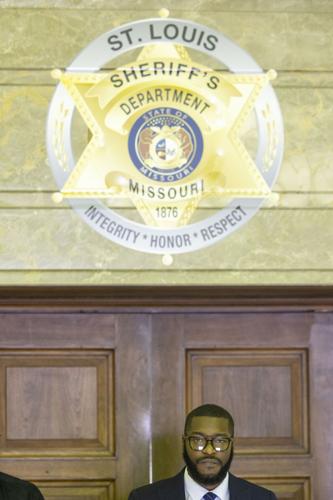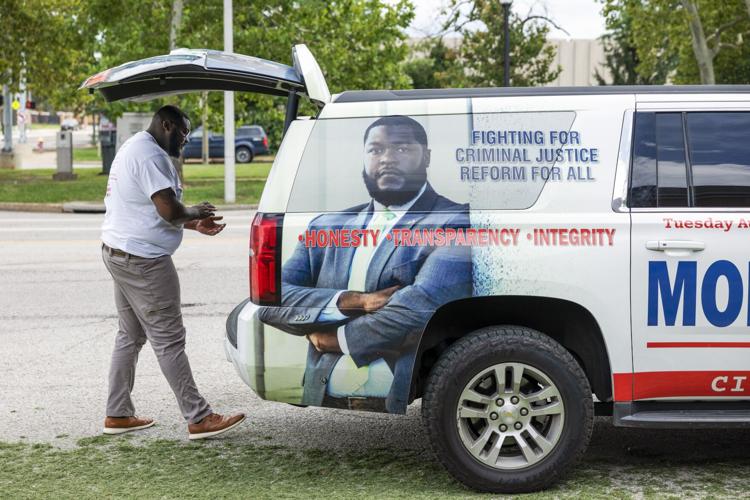
ėŻ╠ę╩ėŲĄ Sheriff Alfred Montgomery reads a statement at the Civil Courts Building on Tuesday, June 24, 2025, declaring he will not resign. Missouri Attorney General Andrew Bailey has called for him to do so.
ST. LOUIS ŌĆö Just weeks after taking office in January, Sheriff Alfred Montgomery showed up at city police headquarters for a meeting.
It was unclear why. It was a high-level, confidential meeting for top police officials to discuss crimefighting strategy. And in ėŻ╠ę╩ėŲĄ, the sheriffŌĆÖs office is not tasked with general law enforcement.
Montgomery told police that City Hall had extended an invitation, former officials told the Post-Dispatch. Police called the mayorŌĆÖs office asking if that were true.
ŌĆ£And we were like, of course not,ŌĆØ recalled Conner Kerrigan, who was the mayorŌĆÖs communications director then.
Montgomery ended up leaving. A spokesman for the sheriff this week blamed a scheduling error. But it raised alarms at City Hall and in the police department.
ŌĆ£This is a meeting where very sensitive issues are discussed,ŌĆØ another mayoral adviser said. ŌĆ£ItŌĆÖs not a punch-and-cookies meeting.ŌĆØ
People are also reading…
Over the past six months, the cityŌĆÖs new sheriff has set off alarms and pushed the boundaries of his office in a number of ways.

ėŻ╠ę╩ėŲĄ Sheriff Alfred Montgomery speaks to the Board of Aldermen about his departmentŌĆÖs budget deficit during a meeting at City Hall on Monday, June 2, 2025.
He has proclaimed himself the cityŌĆÖs top law enforcer, claimed dominion over the jail and had a top jail official handcuffed when she got in his way. He has demanded more money and more staff for the department, threatening to quit carrying out some traditional sheriff duties if he didnŌĆÖt get what he asked for. And he has sought to remake the image of the office, spending tens of thousands of dollars on redesigned badges, new uniforms and a new Chevrolet Tahoe for himself.
But MontgomeryŌĆÖs path to the sheriffŌĆÖs office started decades ago in north ėŻ╠ę╩ėŲĄ, steeped in city politics. He grew up in a Carr Square housing project, where he could walk outside his front door and bump into politicians and ward chiefs, who were always looking for an extra pair of hands.
His first city job was in the sheriffŌĆÖs department but not for long. He quickly decided he wanted the top spot.
As he began campaigning, he started making claims about his background, college degrees and bona fides ŌĆö several of which donŌĆÖt check out.
Now, Missouri Attorney General Andrew Bailey is suing to oust Montgomery from office. Bailey claims Montgomery has put a family member on his payroll, had a deputy chauffeur his children, misspent hundreds of thousands of dollars, shirked key department responsibilities and made a mockery of the office.
The first hearing in the case is scheduled for Wednesday.
ŌĆ£ItŌĆÖs an incredibly serious thing to pursue the removal of an elected official,ŌĆØ Alderman Michael Browning said when Bailey demanded that Montgomery resign. ŌĆ£But I think the conduct of the sheriff rises to that level.ŌĆØ
Montgomery has said he wonŌĆÖt step down.
ŌĆ£I will not stand by while this office is attacked in the press with false claims and reckless accusations,ŌĆØ he said at a news conference after BaileyŌĆÖs demand.
ŌĆ£LetŌĆÖs be very clear: I have not been found guilty of any wrongdoing,ŌĆØ he continued. ŌĆ£And I will not be removed from this office.ŌĆØ
This past week, Montgomery spokesman John Gieseke brushed off questions about inconsistencies in the sheriffŌĆÖs r├®sum├®.
ŌĆ£Sheriff Montgomery was duly elected by the voters of ėŻ╠ę╩ėŲĄ, and he meets all legal qualifications required to hold office,ŌĆØ Gieseke said in an email.
ŌĆ£Attempts to undermine our administrationŌĆÖs credibility,ŌĆØ Gieseke continued, ŌĆ£by cherry-picking outdated, miscellaneous claims from our newly elected SheriffŌĆÖs personal social media or old campaign materials, some over five years old, are misleading and politically charged.ŌĆØ
Growing up around politics
Montgomery grew up in Carr Square, northwest of downtown and at the corner of a ZIP code area where . His home was in Carr Square Village, which call the first of several housing projects built in the area in the 20th century.
By his own accounts, in public speeches and social media posts, it was not easy. His mother was a teenager when she gave birth to him and couldnŌĆÖt adequately provide for him. His father was addicted to drugs. His grandmother, Brenda Montgomery, raised him.
His neighborhood park was overrun by gangs and drugs, he said.
But Carr Square was also a place where someone could get into politics. When Montgomery was growing up, allegiances in the cityŌĆÖs old 5th Ward were divided between two families: the Fords and the Hubbards. And with residents and their elected representatives all living in such close quarters, everyone knew everyone, and a lot of people got involved, said Alderman Rasheen Aldridge, who grew up in the neighborhood with Montgomery.
Aldridge and his mother were Ford people and thus supported then-Alderwoman April Ford Griffin, whose stepfather Louis Ford represented the area for 20 years in the Missouri House. The Montgomery family, meanwhile, supported the Hubbards, Aldridge said.
Aldridge said he would see the future sheriff and his older brother, Whitfield Montgomery, out and about around election time.
ŌĆ£I get why he ran for office,ŌĆØ Aldridge said. ŌĆ£He grew up around politics.ŌĆØ
And over time, he embraced it. He got involved with a civics program at Vashon High School, .
ŌĆ£He was a leader in that program,ŌĆØ said Mark Kasen, who taught MontgomeryŌĆÖs government class and ran the program.
In the fall of 2014, Montgomery, then a senior, led dozens of Vashon students in a walkout protesting classroom conditions and demanding better education. He then met with school district officials on the concerns.
David Jackson, one of the school board members, said recently that he didnŌĆÖt understand what the fuss was all about.
ŌĆ£I think he just wanted to show he had the power to get the kids to walk out,ŌĆØ Jackson said.
But Montgomery impressed Kasen, his teacher.
ŌĆ£Alfred had this idea of civic duty,ŌĆØ Kasen said. ŌĆ£And thatŌĆÖs what that was all about. He really did believe that he had an obligation to try to straighten out some of the problems at the school.ŌĆØ
ŌĆśLike a fool, I hired himŌĆÖ
After Vashon, Montgomery went to work for then-state Sen. Jamilah Nasheed, who represented north ėŻ╠ę╩ėŲĄ neighborhoods. Campaign records show he was paid $2,740 for campaign work in the summer of 2016 in the run-up to NasheedŌĆÖs reelection primary.
The LinkedIn profile under his name says he started work for William C. Harris funeral home in ėŻ╠ę╩ėŲĄ County in May 2017. Officials there did not return calls seeking confirmation.
He attended ėŻ╠ę╩ėŲĄ Community College for the fall 2017 and spring 2018 semesters, though he did not receive a degree, according to the registrarŌĆÖs office.
In 2019, Montgomery got his first job in the sheriffŌĆÖs office. The previous year, then-Sheriff Vernon Betts, whom Montgomery would later unseat, had gotten a bill passed in Jefferson City to help professionalize his department. Nasheed had . In the summer of 2019, Betts said, she called in a favor.
ŌĆ£I bet she called me every day for a month,ŌĆØ Betts said. ŌĆ£And like a fool, I hired him.ŌĆØ
Nasheed disputed that characterization. She acknowledged passing the bill and urging MontgomeryŌĆÖs hire. But, she said, ŌĆ£those things were totally separate.ŌĆØ
By all accounts, MontgomeryŌĆÖs tenure, which lasted less than six months, did not end well.
According to Betts and his allies, Montgomery was not a good employee: He missed shifts. He talked trash about Betts. He broke policy.

Alfred Montgomery wipes his hands after placing campaign signs in his car on Thursday, Aug. 8, 2024, in ėŻ╠ę╩ėŲĄ. Montgomery defeated ėŻ╠ę╩ėŲĄ Sheriff Vernon Betts during the Democrat primary.
Betts and two former supervisors recalled an instance when they got a call from police saying Montgomery had been bothering officers detaining suspects on the street, asking the cops why they were arresting people he knew. Then, Betts and his supervisors said, Montgomery broke policy by taking a picture of himself in a courtroom ŌĆö which he would later use on his campaign social media account ŌĆö something generally not allowed without permission from the courts.
Betts said when he called Montgomery into his office to straighten things out, the young deputy insulted him.
ŌĆ£That son of a gun looked me in my face and told me, ŌĆśYou donŌĆÖt know what youŌĆÖre doing,ŌĆÖŌĆØ Betts recalled in a recent interview. ŌĆ£Just like he owned the place. I said, ŌĆśWhat the hell?ŌĆÖŌĆØ
In December 2019, Betts fired him, citing absenteeism, interference with police business and violations of the officeŌĆÖs social media policy.
Montgomery posted to social media saying heŌĆÖd been canned for ŌĆ£exercising my constitutional 1st amendment right to run for Sheriff for the City of ėŻ╠ę╩ėŲĄ.ŌĆØ He told the Riverfront Times the sheriff was trying to . Gieseke, MontgomeryŌĆÖs spokesman, this week again brushed off the claims.
ŌĆ£Vernon Betts says a lot of things,ŌĆØ he said.
Montgomery spent the next nine months running for office, only to lose in a landslide. Four years later, he tried again, this time with more money, plus endorsements from then-Mayor Tishaura O. Jones and Aldermanic President Megan Green, who had tired of BettsŌĆÖ penchant for off-color remarks in the media. Montgomery won by a little more than 250 votes, or about half a percentage point.
In each campaign, he made new claims.
He said he was a licensed funeral director.
He said he had interned at the city police department.
He told the Post-Dispatch he had a sociology degree from Arizona State University.
He said in a LinkedIn post he had an associateŌĆÖs degree focused on political science and government from Lincoln University, in Jefferson City.
But the state Board of Embalmers and Funeral Directors this month could not find any record of him holding such a license, active or inactive. The police department said it could find no record of him interning. Officials at Lincoln University said they had no record of an Alfred Montgomery receiving a degree.
Arizona State said it had no record of Montgomery even attending.
New allegations
Gieseke, MontgomeryŌĆÖs spokesman, said last week it was unfair to dredge up ŌĆ£outdatedŌĆØ claims about things not legally required to hold the sheriffŌĆÖs position.
ŌĆ£Last time I checked, you donŌĆÖt need a funeral license to be the Sheriff,ŌĆØ he said in an email.
Moreover, he said, the LinkedIn profile under MontgomeryŌĆÖs name may not be controlled by Montgomery.
ŌĆ£It should not be treated as a definitive biographical source,ŌĆØ Gieseke said.
Still, just hours after the email, the degree claims were removed from the profile.
Gieseke also said the sheriff has a certificate from his police internship, though he did not respond to multiple requests to see it.
Now, the attorney generalŌĆÖs suit is alleging new falsehoods.
On his first day in office, the lawsuit says, Montgomery hired his half-brother ŌĆö violating the state constitutionŌĆÖs ban on nepotism ŌĆö and then directed people to hide that fact. Gieseke said at the news conference that Montgomery had not made the hire.
BaileyŌĆÖs suit says the sheriffŌĆÖs office failed numerous times to transport jail detainees to medical treatment, a longtime department duty. Montgomery said his deputies were doing the job with great effort and at great expense.

Sheriff Alfred Montgomery's new Chevy Tahoe, on June 5, 2025.
In January, Montgomery called police to report a former sheriffŌĆÖs deputy impersonating police at a Dutchtown gas station and seized the deputyŌĆÖs gun and badge. But when officers responded, they said the deputy was working as a security guard and had a valid license.
But MontgomeryŌĆÖs biggest step into hot water might have been on Feb. 14.
That day, he had gone to the city jail, saying he wanted to interview an inmate whom he claimed was part of an internal investigation. And he said that when a top city jail official, Tammy Ross, denied him entry, he had her handcuffed and detained, setting off a firestorm of criticism.
Montgomery told local media that police and city Public Safety Director Charles Coyle had given him permission to interview the inmate. But police and Coyle both said that was not true. Mayor Jones called for an investigation.
The incident ŌĆö particularly the handcuffing of a city official ŌĆö had mayorŌĆÖs office staffers worried about what would happen next. One of them was directed to look into how a vacancy would be filled if the sheriff ended up resigning, getting indicted or getting removed by someone like the attorney general. Kerrigan, the former adviser, emphasized there was no mayoral effort to remove him.
ŌĆ£But it was like, we might not have a sheriff soon,ŌĆØ Kerrigan said. ŌĆ£What does that look like?ŌĆØ
After referencing a Post-Dispatch article about the sheriff's recent controversies, Alderman Michael Browning questions Sheriff Alfred Montgomery on budget requests. Video courtesy of the City of ėŻ╠ę╩ėŲĄ, edited by Jenna Jones.




















